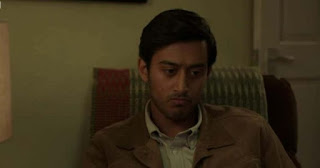But the victim, too, also returns to the scene of the crime. Sometimes physically. But always mentally. Time and time again. Running events over in their head to try and make sense of them, to try and see if they were, in some way, complicit in their own victimhood, and, ultimately, to try to find closure and move on with their life.
A rollercoaster of emotions. While sexual abuse and transgressions of all kinds and the nature of consent was the show's over-arching theme it also took in issues of race (and how race relations are played out in the media, in the legal system, and in education), social media, male pride, public shaming, friendship, and the difficulty of finding love in both the big city and the modern, permanently on-line, world.
Arabella (played by series writer and creator Michaela Coel) is a young streetwise black woman in an electric pink wig living in Hackney. She sits on the toilet chatting on the phone while smoking a joint, she's got an on-off boyfriend Biagio (Marouane Zotti) who deals drugs from his apartment in Ostia in Italy, and her Tweets and 'Chronicles of a Fed Up Millennial' have made her a minor Internet celebrity and earned her a book deal.
The best, and worst, of it. Well sketched conversations on everything from Grindr, threesomes, and selfies to anxiety, depression, drug use, and the issue of black women's hair are touched on not just in late night, and sometimes wasted, chats between Arabella, Terry, Kwame and others but also via their text messages which appear on our screens via the cracked screens of their mobile phones. When purple hearts appear on Arabella's Instagram posts they're rendered as beating, as vital, as real hearts. The change in Arabella's expression conveys to us just how much warmth they provide her with.
Arabella's journey towards understanding what has happened to her also takes in, via podcast advice and the help of a rape survivor's group, a reassessment of previous sexual encounters in her life including those with Biagio and Zain (Karan Gill), a writing partner her agency has chosen for her who removes his condom without telling Arabella during sex and is later exposed, in public, by Arabella, as a rapist:- "not rape-adjacent or a bit rapey. He's a rapist".
While most of us, in real life, can square these notions it seems dramatists often struggle to do so. Coel does it brilliantly. I May Destroy You is never boring and it's never hectoring. It doesn't lecture you but creates a dialogue with you by understanding that expression, as with everything else, is nuanced while at the same time understanding, and making absolutely certain, that when it comes to sexual abuse nuance is no excuse.
The script is clever and finessed, it feels to me like Coel agonised over making it sound as realistic and conversational as possible - it takes a lot of hard work to make things sound so natural, and, most of all, it is bold. One fantastic episode drops back a decade and half to look at Arabella and Terry as teenage schoolgirls and an incident involving Theodora (Harriet Webb), a classmate who now works as a rape counsellor and has barely featured in the story up to this point, and it's an absolute masterclass in how to flesh out existing character's back stories while simultaneously weaving a new thread into an already complex whole.
The soundtrack too (Grimes' Oblivion, Flowers by Sweet Female Attitude, Nightmares by Easy Life, 3 of a Kind's Babycakes, and DJ Luck & MC Neat's Little Bit of Luck among many other great tunes) is to be treasured. It fits both the action and the personality of the characters and the scenarios they find themselves in perfectly.
While there are, especially towards the end, action scenes and even what one might call a set-piece or two, for the most part it's the dialogue between the characters that does the heavy lifting. A lot of the conversation we're witness to is, like a lot in life, implication, subtext, and expression more than it is explicit. It'd be disingenuous to ask for anything else. Coel's not taking her audience for idiots. She knows not everything needs to be spelled out. She knows she can present us with an impression and our own experiences will paint the rest of the picture.
I wrote, at the start of this piece, that I May Destroy You was a "rollercoaster of emotions" but rollercoasters just go up and down, round corners, and, occasionally, loop the loop. I'd chosen the wrong fairground attraction. I May Destroy You was more like a waltzer. Dizzying, spinning the viewer round in so many different directions that it was often hard to tell where we were facing, even if we'd accidentally been turned upside down. Once the ride was over I felt like I'd been shook up more than a little but I also felt completely exhilarated and awe-struck and whatever Michaela Coel comes up with next I'll be joining a no doubt very long queue to have myself spun round as hard as that again. A masterpiece.













No comments:
Post a Comment